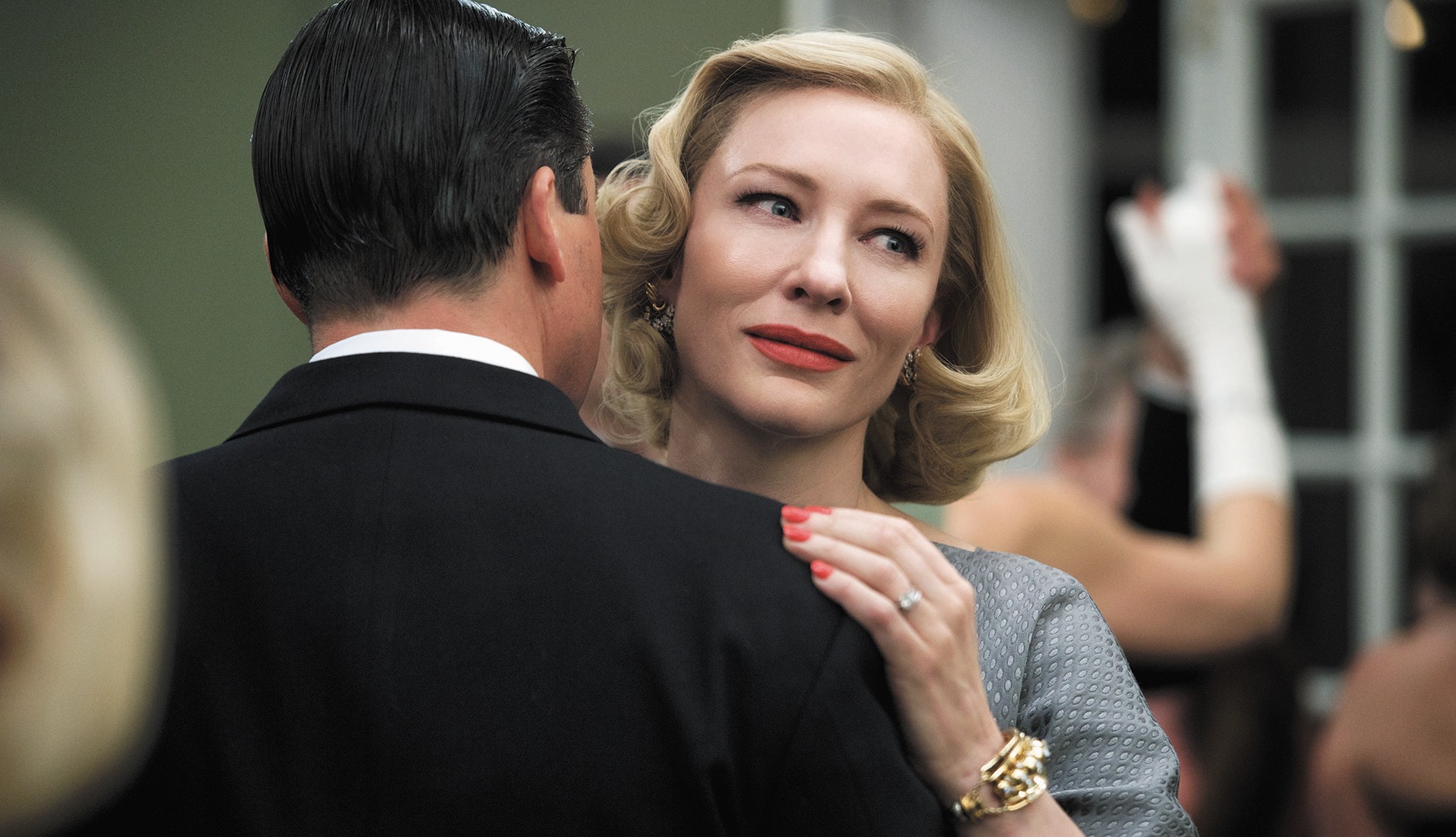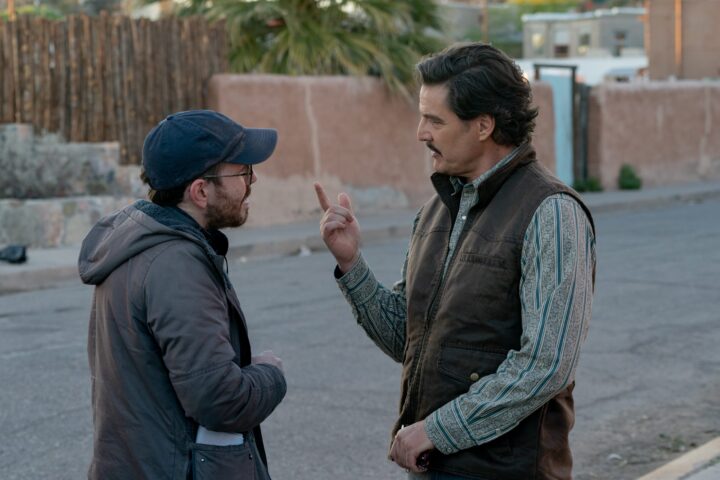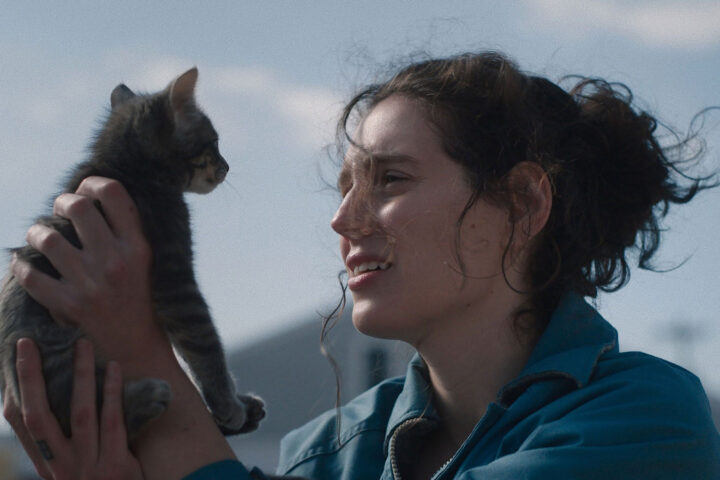Todd Haynes’ Carol, as gorgeously rendered an evocation of star-crossed love as the movies has maybe known, is a meticulously mounted, finely felt and beautifully acted examination of the costs of self-actualization in an unforgiving world. With a screenplay by Phyllis Nagy from Patricia Highsmith’s 1952 novel The Price of Salt, about forbidden love and its consequences in a time of repression, fear and tradition, the consummate artist Haynes delivers a movie for the eye, ear and heart, and one that should be at the top of any “best” list this year.
Starring the unparalleled Cate Blanchett as a lesbian trophy wife circa post-war, 1952 New Jersey, it is a movie that grows in your mind after you have seen it, unabashedly a work of art by way of its perfect union of director and star, one that is high-toned in aesthetics yet deeply accessible in emotion. And like Blanchett’s searing portrait of journalist Mary Mapes in this year’s Truth, her Carol is so vividly realized there seems little doubt that the actress is firmly affixed in the pantheon of the greats—with any justice, either picture would net her a third Oscar.
Blanchett’s Carol Aird is a perfectly coiffed, impeccably coutured, suburban trophy wife to her aloof investment banker husband, played by Kyle Chandler, cuckolded by his wife’s inability to fulfill domestic matrimony. With Carol, nothing is what it seems. Underneath the layers of civility and sophistication lie festering secrets, marital and identity crises in full flower. In all regards, Carol seems the epitome of perfection—elegant, popular in social circles, good in both the kitchen and with their young daughter, whom she lives in fear of losing, thereby living a slow, silent death within the closet of a seemingly happy marriage.
Carol has no one to talk to except best friend Abby (the excellent Sarah Paulson), a lifelong friend and former fling. Until one day she browses a Manhattan toy store in search of Christmas gifts and her life changes.
Therese Belivet (Rooney Mara), a shop girl with dreams of becoming a photojournalist, is as reserved as Carol is garrulous. The women chat about a toy train, Carol coyly flirtatious, and after she leaves her expensive gloves behind on the counter, Therese arranges return. Pretty, quiet and uncertain of herself, Therese is attached to a milquetoast boyfriend (Jake Lacy) who has no idea what is coming. Neither does she.
After accepting Carol’s lunch invitation, Therese finds herself intrigued by her glamorous new friend, and it isn’t long before the women are spending Sundays at Carol’s country house, Christmas tree shopping and bonding over gifts to each other, including a Billie Holiday record and an expensive camera.
Things escalate on a wintry road trip to Chicago, where they spend the night in the tony Drake Hotel, and then on to an Iowa motel where the relationship is finally consummated (about an hour and twenty minutes into the picture—that’s how slow burn the build-up is). But husband Harge is on their trail, his coup de grace hiring a private investigator to railroad Carol into charges of moral indecency, an acrimonious divorce and threats of never seeing her daughter again. Steep price to be happy.
Carol enters psychotherapy determined to make things work, but after a shattering Christmas lunch with her disapproving, blue blood in-laws, she faces a cruel ultimatum in one of the movie’s best scenes, a divorce mediation where Blanchett gets the movie’s most memorable line: “This is going to get ugly. And we are not ugly people.” Like her work in Truth testifying against CBS’s investigatory panel, Blanchett levels the room with her voice and eyes, and everyone else onscreen all but disappears.
Meanwhile, devastated Therese bonds with Abby, gets a job at The New York Times and starts life anew. But will the women ever see each other again? And is there a chance for them to be happy?
Haynes, the gifted auteur so attuned to the emotional tribulations of his female characters—including Julianne Moore in both Safe and Far from Heaven and Kate Winslet in HBO’s Mildred Pierce—has led Blanchett to an Oscar nod prior for their collaboration on his daring Bob Dylan exploration I’m Not There, and their work together here seems certain to garner nods for each. Having spent the last 25 years working largely outside the Hollywood studio system while delivering indelible and personal movies like Poison, Velvet Goldmine and those mentioned above, Carol may be Haynes most mainstream accessible work to date—which isn’t to say his artistic vision and command have been blunted; quite the opposite.
Working with his gifted DP, Ed Lachmann, Haynes’ vision of Carol, filmed in Cincinnati doubling for period Manhattan, is a dreamlike otherworld of high grain (the film was shot on 16mm and then blown up) and a multitude of reflective surfaces separating both women, from car windows to raindrops to mirrors, and a late picture, luminous shot of Blanchett peering through a rear taxi window is one of the great movie star close-ups, a perfect amalgam of make-up, hair, costume, composition and, of course, actress. Throughout, Carter Burwell’s driving score (suggesting Phillip Glass’ equally affecting work in The Hours) is one of the few this year that merits stand-alone, repeat listens.
Blanchett, at the top of her game, is an absolute vision in the titular role, so fully convincing as a period blonde society maven that one contemplates where her boundless imagination and capacity for portraiture and detail lives; there’s not a false note as she deconstructs a well put-together woman perfectly coming apart.
And while I know I’m in the minority here as co-star Mara won the Best Actress award for this performance in Cannes last year, as per usual the actress seems to be underplaying, and only sometimes effectively. Her Therese is a minimalist, and next to Blanchett, feels somehow lesser (though arguably spot on for the character), though the actress certainly captures a particular emotional crossroads with, at times, touching honestly.
Carol, like its extraordinary director and star, is in the top echelon of movies this year with its sensitively written, directed and acted story of personal liberation and the courage to love.
Unmissable.



